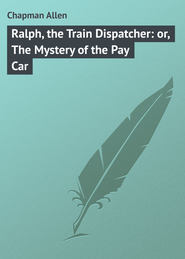По всем вопросам обращайтесь на: info@litportal.ru
(©) 2003-2024.
✖
Tom Fairfield at Sea: or, The Wreck of the Silver Star
Настройки чтения
Размер шрифта
Высота строк
Поля
It came.
Surely aimed had been the cannon, for the ball cut right through the center of the twin-joined funnel-shaped masses of water. The one that had risen from the sea slumped down into the waves again, carrying with it the mass of water that had been drawn from the heavily charged cloud, and Tom got a wonderful picture of the destruction of the spout.
“There, I guess that won’t trouble us any more, even if it had been headed directly for us!” called the captain, while he signalled for full speed ahead, since he had slowed down the vessel to enable Tom to take the snapshot.
“It was great!” exclaimed our hero, as he went up on the bridge to thank his friend the commander. “Do waterspouts do much damage?”
“They do when they’re big enough, and when they hit a small vessel. Even a big steamer might suffer from having thousands of tons of water dropped on her decks at once. I don’t want to encounter a waterspout. They are quite rare I believe. At least I’ve seen very few, and the farther off they are the better I like ’em. Did you get a good picture?”
“I hope so. But I can’t develop it here.”
“Oh, yes you can. I used to be quite an amateur photographer myself, and I had a dark room fitted up on board. I guess there are all the chemicals and other things you need, including the ruby light. Go ahead and develop your film, and see what sort of a view you have.”
“That’s great!” exclaimed Tom. “If they’re any good I’ll make some for you.”
“All right. I’ll be glad to have ’em.”
Tom went below, noting as he did so that the sea was still foaming and agitated where the waterspout had subsided into the waves. The passengers were crowded about the gun that had been fired, congratulating the gunner, and talking about the waterspout and its sudden destruction.
To get to the dark room, fitted up in a small stateroom, Tom had to go past the room of the “mysterious” passenger.
“Queer he wouldn’t even come up on deck to see the waterspout,” mused our hero. “He must have some strange object in remaining below. Well, I’m not going to think anything more about him.”
As Tom got in front of the stateroom he noticed that the door was partly opened, and, almost instinctively, and with no intention of prying, he looked in as he passed.
What he saw startled him. There was an electric light aglow in the apartment, for the clouds had made the day gloomy, and Tom caught the reflection in a looking glass on the wall. And what he saw in the glass was the face of a man with a beard and moustache. It was a face that Tom knew well, but it was not the face of the passenger who had so hurriedly boarded the ship, and who had kept to his berth ever since.
“A beard and moustache!” gasped Tom. “I wonder if they’re false? And yet they might have grown naturally. But no, they couldn’t have, in this short time. They’re false. And I know who that man is now! I didn’t know him smooth shaven, but I do with his beard.”
He had a good glimpse, by means of the mirror, of the face of the mysterious man. The passenger appeared to be contemplating his countenance in the glass.
“He here!” gasped Tom, as he hurried on to the dark room. “That man on board! I must tell Captain Steerit!”
CHAPTER VII
THE STORM
Filled with his new idea, and alarmed at the possible menace to himself, Tom turned, and was about to retrace his steps up on deck to speak to the captain. Then he paused.
“Hold on a minute, Tom Fairfield,” he told himself. “And don’t do anything in a hurry. You came off on this voyage in a rush, and maybe that was a good thing. But just wait a minute now, and see if this is the best step to take.”
He turned again, and once more walked past the stateroom of the suspected man. The door was closed this time, and Tom was rather glad of it, for he did not want to meet the passenger, now that he knew who he was.
“I’ll just wait a bit about telling the captain,” reflected Tom. “When I tell him the story he’s bound to take some action, seeing that Mr. Trendell is sailing under false colors. And that’s bound to make a row. It won’t be pleasant for me, either, seeing that I’ve got to stay on this ship with him for some time yet. And a ship isn’t like dry land – you can’t get away from a person when you want to.
“No, it’s better for me as it is, I think. As long as he stays shut up in his stateroom he won’t bother me, though he knows that I’m on board. That’s why he acted so queer, and why he’s been in retirement. Now he’s planning some new move.
“Yes, I’ll just lay low for a while, and see what happens. There’s time enough I guess. I’ll go develop this picture.”
Tom found the dark room well fitted up, and he was soon at work, taking the films from his camera, and putting them in the developing bath. As soon as the yellow coating began to dissolve he saw, coming out of the shadows, as it were, the dim image of the waterspout, and the shattering of it by the cannon ball.
“Say! That’s a crackerjack snapshot!” he exclaimed. “As soon as it’s dry enough I’m going to print some views and show ’em. I don’t believe anyone on board has any better pictures than these.”
In his enthusiasm over his views he forgot, for the time being, the matter that was troubling him. He found that he had a number of excellent negatives of the waterspout, showing it approaching, its destruction, and the raging sea after it had subsided into the waves.
“Good! That’s great!” exclaimed Mr. Blake, one of the passengers to whom Tom showed his views a few hours later. “I hope mine come out as fine as yours. How did you print them so quickly?”
Tom explained how he had dried his negatives by dipping them in alcohol, and pinning them in front of an electric fan, so that he could make prints a comparatively short time after developing. He even used the dark room for some of the other passengers, making some prints from their films, but none of them were as good as those of our hero.
“You ought to make a set for the captain,” suggested Mr. Blake. “I believe he’d like them to hang in his cabin, as a souvenir of the occasion.”
“I will,” declared Tom, and this brought up anew in his mind the question as to whether or not he ought to inform the commander of the secret he had unexpectedly stumbled upon.
“I guess I’ll take a chance, and tell him,” mused the lad. “I’ve thought it all over, and I’ll feel better if I tell. If I don’t, and anything happens, I’d feel as if I was to blame. I’ll tell Captain Steerit.”
But an unexpected obstacle developed. First, when Tom went to look for the captain the latter was working out some reckonings, and could not be disturbed. And then, a little later, it was time for supper, and a concert was to be given afterward, the captain having arranged for it among the musical members of his passengers. He was really too busy for Tom to see him in private.
“Oh, well, morning will do,” decided our hero, little knowing what was to happen between night and dawn.
The concert was a great success, though it was strictly amateur. There were songs and instrumental numbers, for the Silver Star carried a piano. Some one discovered that Tom was a school lad, who had been a member of the glee club at Elmwood Hall, and nothing would do but that he must sing some songs. He did not want to, but was finally prevailed upon to do so, and he had a better voice than he himself suspected.
“Great! Fine!” complimented Mr. Blake. “If there were more of us here we could charge admission and make a fund for the sailors. Now, Mrs. Ford, another of your piano solos.”
Thus the evening went on in gaiety until even the gayest were ready for their staterooms.
“Maybe I’ll get a chance to speak to the captain now,” thought Tom, wishing to get the unpleasant matter off his mind before he went to bed, if possible. But Captain Steerit was still busy, and when he did have a moment’s leisure, after the main cabin had been put to rights following the concert, he was summoned to the bridge by an unexpected call.
“I wonder if anything can be wrong?” asked Mr. Blake of Tom.
“Wrong? How? What do you mean?”
“Well, I mean that the wind has been rising rapidly in the last hour, and the barometer is falling. I heard one of the crew say so.”
“That means a storm,” suggested Tom.
“I guess so. Notice how we’re pitching and rolling.”
“That’s right,” agreed our hero, for, now that his attention was not occupied with the music and songs he could observe that the ship was heeling over at a sharper angle. And, too, she seemed to be climbing up some mountain of water, only to slip down into the hollow on the other side of it.
“It is a little rough,” spoke Tom, “but I don’t believe it will amount to much. Let’s go up and look around.”
The motion on deck was more pronounced than it had been below, and the two had some little difficulty in keeping their feet as they got outside. They felt the strong wind in their faces, a wind that seemed to be momentarily increasing in violence.
“Better get below!” shouted Captain Steerit to Tom and Mr. Blake, from the bridge. “We’re in for a spell of bad weather I fancy.”
“Any danger?” yelled Mr. Blake, above the roar of the wind, which was humming through the mast and funnel stays. “My wife is very nervous.”
“No danger,” answered the commander, and then he disappeared into the charthouse that opened off the bridge.











